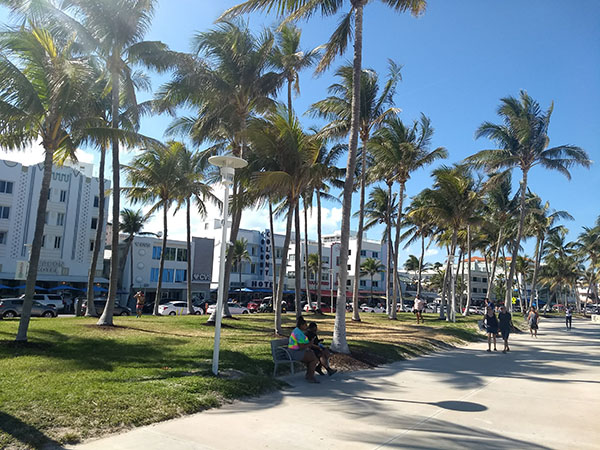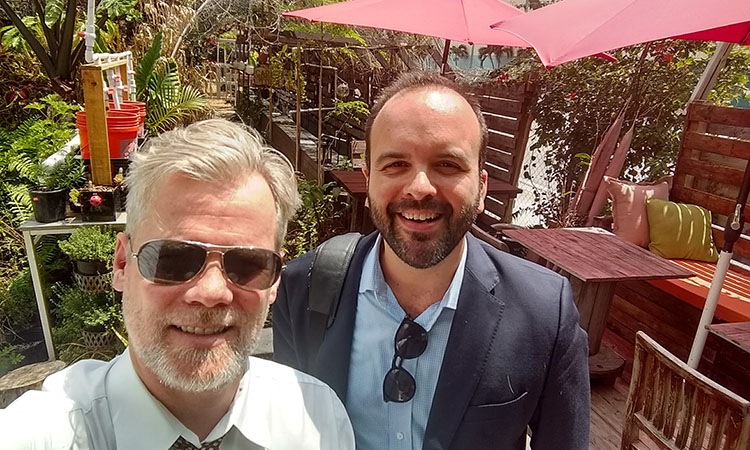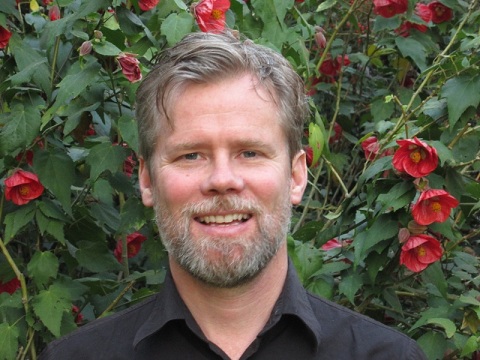As part of Shareable's global book tour for our latest publication, "Sharing Cities: Activating the Urban Commons," I was invited by Ric Herrero of Mano to Miami to speak at Venture Café Miami and Miami Maker Faire, one of the largest Maker Faires in the U.S., earlier this month.
Ric did me the great honor of setting up meetings with leaders in Miami's civic ecosystem beforehand to share our vision of Sharing Cities and learn about Miami's sharing potential. Along the way, I learned a lot about challenges and opportunities for shared prosperity in Miami. What follows are highlights from the trip, which show that as a host and sharing advocate, Ric went above and beyond.
Our first stop upon arrival on Wednesday, April 4, was Little Havana. Over some delicious Lechon Asado at El Exquisito, an old school Cuban restaurant, Ric briefed me on the upcoming meetings and his experience as a child Cuban émigrés and leader in Cuba-related politics nationally. At dinner and over the next couple days, I learned about the trauma of the migration sparked by Fidel Castro's revolution, the lost livelihoods, the fractured families, the challenges of remaking a life in a new country from nothing, and how this hardship created a hard line against normalized relations with Cuba which started to soften during the Obama administration and how Cubans helped turn Miami into a center of Latin American commerce. It provided vital context for our conversations about sharing over the next few days.

Art and posters on the wall at Tap Tap, a Haitian restaurant in South Beach
Our first meeting the following morning was with Chris Caines, executive director of Miami Urban Future Initiative at Florida International University (FIU). In the coworking area at Cambridge Innovation Center (CIC), Chris shared a new report with us, "Miami's New Urban Crisis," written by Richard Florida's Creative Class Group with the support of FIU and the Knight Foundation. It describes Miami's transition to a more knowledge-based economy from tourism, transportation, and real estate. In that transition, as is true with other leading global cities, too many have been left behind in a process referred to in the report as "winner take all urbanism." Like the book the report is based on, it charts a way toward a more inclusive prosperity with obvious recommendations like building more affordable housing. Unlike the book, the report gives a data-driven look specifically at Miami's new urban crisis as compared to other U.S. cities. The report looks at income inequality, where Miami is tied with New York City for the highest level of income inequality in the U.S., and the housing cost burden, where Miami is the second just behind Los Angeles, and much more. The high level of inequality in Miami surprised me, especially the housing cost burden. Chris emphasized how important it was to base discussions about addressing the inequality crisis on facts, something that had been lacking in Miami politics. I also heard something mentioned repeatedly over the next couple days — a tendency for Miamians to underemphasize problems. The report does a great service in laying the stark facts about inequality in Miami bare. I shared our new book with Chris. Ric and I explained how the solutions therein could help address the inequality crisis, and we promised to stay in touch.
After our meeting with Chris, Ric and I shared a delicious lunch at Smart Bites organic café across the street, locally famous for growing much of its produce onsite. Then we headed over to see Mike Sarasti, the chief innovation officer (CIO) at the city of Miami, who is breaking trail as the city's first CIO. Mike got right down to business. He zeroed in on "entry points" for application of the cases and policies from our book to Miami. We quickly explored Shareable approaches to food (especially during natural disasters), housing, small business, and freelancers. The cases relevant to small businesses freelancers in particular struck a chord as one of Mike's priorities is streamlining the procurement process while expanding who can compete for the city's business. The procurement requirements often make it difficult if not impossible for small, local businesses and freelancers to bid for city jobs. Big, national firms are often the only qualified vendors. On the city's side, it's difficult to hire people to do small jobs, like spending $2,000 for a little design work, something a freelancer could easily and profitably do. We talked about how the Evergreen Cooperatives in Cleveland and SMart freelancers cooperative in Europe band small, local businesses and freelancers (respectively) together to better compete in the marketplace, and, especially in the case of Evergreen, serve "anchor institutions" like universities, hospitals, and local governments. Mike saw how Miami-based freelancers and small businesses, often minority owned, could do the same to compete for city contracts and thus help build local, inclusive prosperity while increasing the nimbleness of city government. This is a key consideration in Miami where a big part of the economy is made up of small businesses and freelancers.

South Beach's public space makes a beaufitful day that much more beautiful
Midway through our conversation, Jane Gilbert, the chief resilience officer of the City of Miami, came back to her desk in the office Mike and Jane share. We chatted briefly about challenges of building resilience across the three local jurisdictions involved in the 100 Resilient Cities initiative. This was another common theme in our meetings — the challenge of effecting change across the 35 jurisdictions that make up the Miami metropolitan area. Miami is a collection of small cities rather than a singular entity. After briefly meeting Joe Ruiz, Mayor Suarez's chief of staff, we headed to our next meeting at Catalyst Miami.
Zelalem Adefris, climate resilience program manager, welcomed us at Catalyst Miami, a local nonprofit that provides an impressive range of services to low-income families in Miami to support them in prospering, leading, and catalyzing action for a better quality of life. That includes everything from financial counseling to leadership training. Zelalem with colleague Mayra Cruz shared their work in Catalyst's Climate Resilience Program, which has roots in the 2015 People's Climate March and the observation that their low-income clients take the brunt of climate change impact. They spoke about their work in the approximately 70 member Miami Climate Alliance (MCA), which builds equity, resilience, and community power by tackling climate change. They’re seeking to strengthen a diverse alliance composed of unions, faith-based groups, climate NGOs, think tanks, community service organizations like Catalyst, and more. Ric mentioned a case from our book, the Community Purchasing Alliance (CPA), which pools the buying power of Washington D.C.-area schools, churches, and NGOs to get lower prices on a range of common services like energy while requiring vendors to meet their labor, social impact, and environmental standards. CPA saves its members millions, creates jobs, and helps the community transition to a just, resilient economy. MCA could do the same and use the savings for even more climate action. Zelalem also shared that Catalyst is moving into cooperative development. Part of what they do is help clients run small businesses. Turns out there are large collection of childcare providers and caterers among their clients, a perfect opportunity for caterers to form a purchasing cooperative or shared kitchen and for the childcare providers to form a platform cooperative.
After an afternoon break, we headed back to the CIC for a book talk moderated by Ric at a weekly event for innovators of all stripes called Venture Café Miami. The talk went well. Ric did an excellent job of moderating. Besides the rich, multi-directional conversation, there were two additional highlights. First, Carla Mays, a long-time friend from San Francisco, and her Miami-based civic innovation colleagues David Capelli and Michael Caballero, dropped into the session unexpectedly. And at the end of the talk, Ric on behalf of Mano sponsored books for the remaining discussants. What a way to cap a terrific day.
Ric and I had one more meeting the following morning with Raul Moas, Miami Program Director at Knight Foundation (KF). Miami is KF headquarters, though they focus on 26 U.S. cities where the Knight brothers owned newspapers, including Miami. KF is one of largest and most prestigious foundations in the U.S. with over $2 billion in assets. They support "informed and engaged communities" through grant making in journalism, communities, arts, and technology. Despite such a prestigious operation, Raul made me feel immediately welcome. We had a great discussion. He shared his plan to help create a world-class startup ecosystem in Miami and thus help attract world-class talent, export innovation globally, and create a more "representative" high-tech economy. He spoke of the big opportunities in logistics, water control systems, and finance which play off of Miami’s existing strengths. Ric and I shared a couple cases from the book (platform cooperatives and cooperative development in general) that could help create a more widely shared prosperity than what's common in more established high-tech regions. Raul was very open to that. We committed to continue the conversation.
That evening I met up with Carla Mays, David Capelli, and Michael Caballero for a soul food dinner at Lil Green House Grill in Overtown, the historic African-American neighborhood near downtown Miami. Along with the delicious food was a rousing, heartwarming, and partly improvised set by a talented local soul singer, Alvin Jackson (A-STONE), who had everyone swinging in their chairs. It was a real treat. Along the way, I learned about the trios' work training local urban planners and the like in the EcoDistricts Protocol, which is part of a larger effort to educate people about and work against climate gentrification, wherein sustainable urban development displaces low-income communities. Part of the solution is to develop more local green building talent who are sensitive to the needs of these communities. Too often, big, national firms are brought in to do LEED certified green building. I wondered how this perspective could be worked into Shareable's vision, shared the work we're doing at Shareable on disaster collectivism, and we committed to find a way to work together. It was a fun and eye-opening dinner thanks to these inspiring pioneers.

Kids show their talent and creativity at Maker Faire Miami
This only left the talk at Maker Faire Miami, which went well as we used the same format as Venture Café Miami with Ric moderating the discussion. After two talks and half a dozen meetings, Ric hammered home an important lesson for me, that for communities that are wary of any initiative with even vaguely socialist connotations, like cooperative enterprises in some circles, it's important to talk about sharing as a right and/or an economic freedom rather than an obligation. After wandering around a beautifully organized Faire after the our talk and meeting up with Ric at the end of the day to talk about next steps like a possible Miami ShareFest with an advocacy camp, I was left with a new perspective for a phrase Ric kept repeating — libertad economica — and a huge amount of gratitude for everyone I met on the trip and the time they spent with me. I can't thank Ric and his friends enough for the opportunity to learn and contribute.
All images, including header photo of Neal Gorenflo and Ric Herrero at Smart Bites in Miami, by Gorenflo/Shareable.









